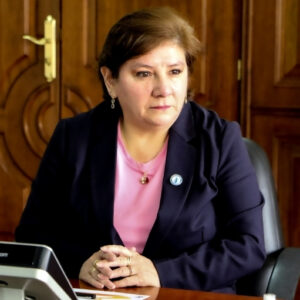In conjunction with International Women’s Day 2021, AFI reached out to women leaders in the network to share their insight on women’s empowerment and the important role women play in financial inclusion. This interview features Dr. Ruth Arregui Solano, Superintendent at Ecuador’s Superintendencia de Bancos.

AFI: Why is financial inclusion, and specifically women’s financial inclusion, important to you?
Dr. Ruth Arregui: I have seen the evolution of financial inclusion over many years through the financial sector and development policies in my roles as a public official, consultant and teacher. Since the last century, studies found that the development and well-being of families has a direct relationship with access to credit. More recently, however, studies began to show that access to adequate financial products and services was also paramount. Since then, many new aspects have been added to strengthen the four pillars of financial inclusion: access, usage, quality and welfare.
In terms of gender, the United Nations said in 2015 that one in three married women in developing countries do not have control over household spending, while one in 10 women do not decide how their own income is used. Other studies have also found that in poor households, women are more responsible than men in honoring debts and improving the quality of spending on goods and services. In other words, women help ensure a better quality of life despite uncertain levels of income. Hence, it is still important to work on closing gender gaps.
AFI: What are unique qualities that women leaders can bring to an organization?
Dr. Ruth Arregui: In running an organization, some studies have suggested that women have certain, more developed qualities than men, including that they are better organized, more committed to objectives; assume decision-making roles; display greater empathy, creativity and innovation and are effective in negotiations and reaching a consensus.
AFI: What are the biggest opportunities you face in developing and implementing policy and regulation focused on women’s financial inclusion?
Dr. Ruth Arregui: We are already achieved many milestones at the Superintendencia de Bancos. After becoming superintendent in April 2019, my team and I agreed on the development of the Institutional Strategic Plan (PEI 2019-2024). It stipulates reforms and improvements to the regulatory framework under the mandate of the Superintendencia de Bancos, helping to protect the users of financial products and services at the institutional level. We also have financial education and teaching programs. Look ahead, Ecuador is about to implement its national strategy for financial inclusion with coordination from the World Bank.
At the personal level, I have authored and co-authored several books and articles to raise awareness of the connection between financial inclusion and the development of micro, small and medium enterprises. They also emphasize the adequate supervision of entities that provide financial products and services, particularly as a source of financial stability. It is important to note that these elements are not independent. The World Bank’s latest Global Findex Database, for example, found that some countries saw improvements in nutrition, business capacity and quality of life among families where women headed the households.
Developments also extend to the international level where a trust fund was created to enable the development of capacities and expand the availability of data to monitor the Sustainable Development Goals, making sex-disaggregated data on financial access an integral and standard part of future financial access surveys. Meanwhile, the International Monetary Fund and the World Bank’s Financial Sector Assessment Program have piloted a guidance note for assessors to help standardize the treatment of financial inclusion as a cross-cutting issue.
In the network, I am also very excited because AFI and GPFI announced that they are developing second level indicators to deepen the analysis and measurement of financial inclusion.
AFI: While the Superintendencia de Bancos de Ecuador is one of AFI’s newest member, you have already been actively working on increasing women’s financial inclusion, especially in the workforce. What can the network learn from your experience in promoting women’s inclusion, especially at the leadership level?
Dr. Ruth Arregui: While it is true that Superintendencia de Bancos is one of AFI’s newest members, personally I am not. Having previously held the position of general manager at Banco Central del Ecuador, I led the central bank’s Maya Declaration and working groups commitments at the 2012 AFI Global Policy Forum.
That same year, we had the opportunity to co-organize with AFI and the Inter-American Development Bank, an international seminar “Central Banks: Payment Systems and Financial Inclusion”, to celebrate the 85 years since the creation of central bank.
In terms of the workforce at the Superintendencia de Bancos and in my position as superintendent, I have been working to improve gender equality by expanding the opportunities to professional women in my country. Currently, 43.2 percent of women are in the workforce with 52.9 percent at the management level.
AFI: What is your message to women in your institution and in our network, across the world, on International Women’s Day, especially during the challenging times of COVID-19 pandemic?
Dr. Ruth Arregui: Values and ethics are fundamental elements of human action in addition to an individuals’ professional skills and competencies. In the case of women, this also includes leadership.
While the COVID-19 pandemic has added significance to the word “resilience”, that word alone is not enough to face and build the social and economic fabric needed for the future. It is necessary to add understanding and optimism so that we can continue to strongly promote the incorporation of women in all areas and aspects of life, especially in the responsible management of strategies and policies that improve financial inclusion and – through it – people’s quality of life as a critical element in preserving financial stability.
I am very grateful to AFI for its hard work, collaboration and coordination, from which we see important results that are reflected in quantitative and qualitative improvements to the measurements that deepen financial inclusion and the enormous task of closing gender gaps.

 About
About
 Online
Online
 Data
Data



















